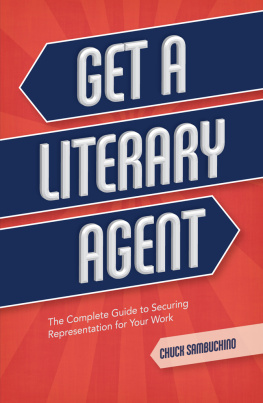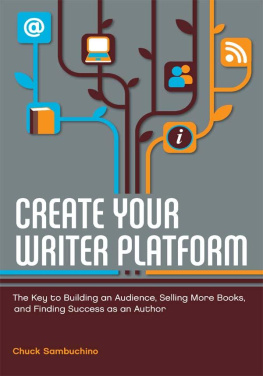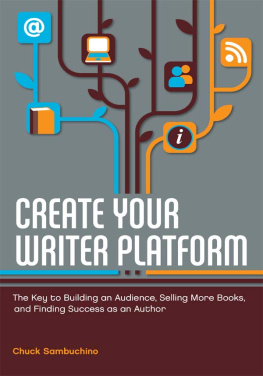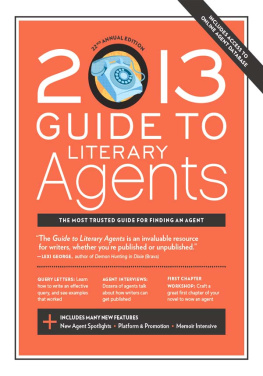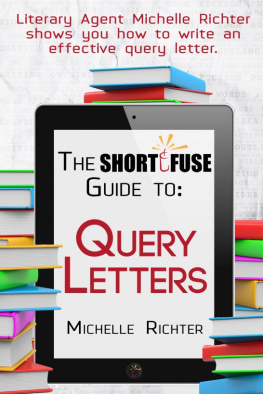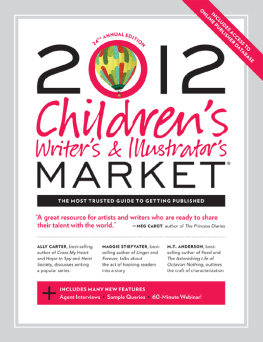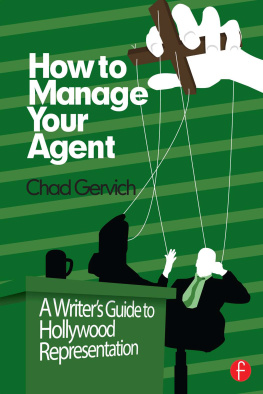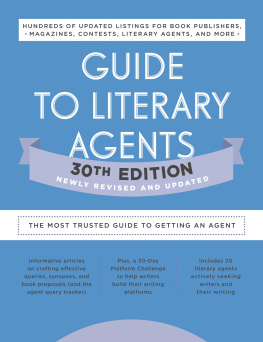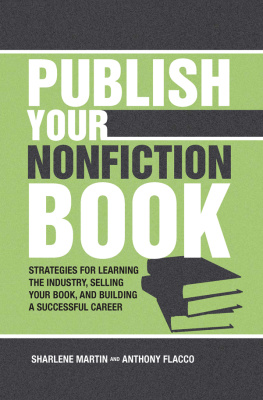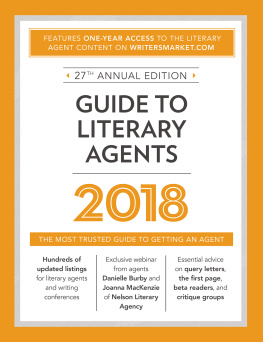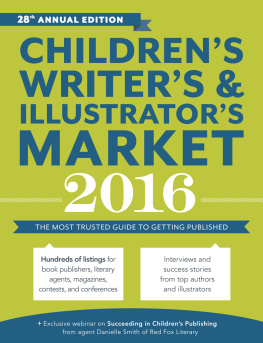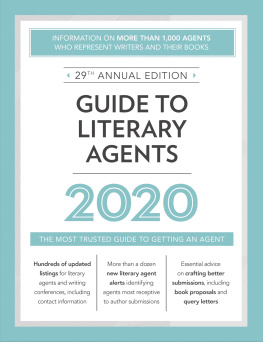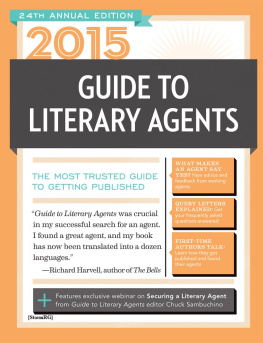Contents
Guide
GET A
LITERARY
AGENT
The Complete Guide to Securing Representation for Your Work
CHUCK SAMBUCHINO

Cincinnati, Ohio
Dedication
For Bre
TABLE OF CONTENTS
INTRODUCTION
When I joined Writers Digest a decade ago and began to meet aspiring authors in person, many would walk up to me and ask the same question: How do I get a literary agent? Ten years later, as I shake hands with new writers at conferences, I still get asked the same question.
Getting an agent to sign you and sell your books is a challenging task. Who are the best ones to contact? What are the ins and outs and best practices for querying agents? How do you give your book the best chance of being read and considered?
These types of questions are the reason I wrote this book. I wanted to give writers a comprehensive resource to address the many frequently asked questions that arise during the journey to find a literary agent. The goal was to create a guide that would offer the advice of numerous knowledgeable agents as well as provide examples of submission materials that speak to all book writers, regardless of category or genre.
The Internet is, unfortunately, a breeding ground for misinformation and half-truths on any subjectincluding how to query and sign with an agent. Many frustrated writers say that an agent wont represent you before youve had a book published, but you cant sell a book without an agentthus creating a catch-22. Its just not trueand its exactly the type of myth I want to dispel so writers can give themselves the best chance going forward.
In fact, having the best chance at writing and publishing success all comes down to educating yourselfabout the craft of writing, professionalism and submissions, research and targeting, genres and book categories, individual agents and their quirks, and so on. The more you learn, the better your chances of finding an agent and publishing a book.
So, without further ado, lets help you find a literary agent as soon as possible.
PART ONE
GETTING READY TO PITCH
CHAPTER ONE
THE SKINNY ON AGENTS (AND WHY YOU WANT ONE)
If youre reading this, chances are youve either written a book or are in the middle of writing one. And chances are, at some point, youve heard a friend or peer explain that you should get a literary agent. But lets slow down for a moment. What is an agent? What does she do? What role does she play in your career? What value does she bring to the table? (Approximately 85 percent of agents are women, so Ill use the pronoun she in this book. But male agents certainly do exist and perform very well at their jobs.)
In short, a literary agent represents you in an effort to sell your book-length works to publishers. She serves as a conduit for getting your work to specific editors who are interested in buying the types of books you write. In other words, the agents foremost responsibility is to get your work into the hands of the specific decision-making persons who can acquire the project and enact a deal for money. Agents are connectorsbridging the wide chasm between writers and editors in an effort to bring books to life.
Besides having the ability to sell books, agents also protect your interests, guide your career, and handle many of the business responsibilities that go along with selling manuscripts. For her efforts, your agent gets a small percentage of all monies you make off a project.
Your agent is not your shrink or your mother or your administrative assistant. Your agent is your friendly publishing professional dedicated to selling your work and building your career. Remember that when the rejections start coming inand the checks, too!
Paula Munier (Talcott Notch Literary Services)
DO YOU NEED AN AGENT?
At one point or another, youve probably asked yourself the following questions: Do I really need an agent? Can I just go it alone and keep the entire payment for my book? The answers depend on the type of book youre writing or have written.
If youre writing nonfiction, the decision to get an agent should rest on whether your book has any limitations. Perhaps youre writing a book about present-day Native American culture in Oklahoma. Such a book has limitations. Its about a niche topic (Native American culture), and it also has a regional focus (in this case, Oklahoma). It could very well be a masterful book, but because of these two distinct limitations, the title will likely sell fewer than 7,500 copies. The book is small in both scope and sales potential. This is exactly the type of nonfiction book you dont need an agent for. Skip the agent, and go straight to an academic or small publisher for a deal. In fact, even if you wanted agent representation, its not likely that an agent would actually sign you, because her financial compensation would be so meager. If a small publisher offers you $1,500 up front for the book, the agents share (at 15 percent) is $225. That isnt a big incentive for her to get involved.
On the flip side, if youre writing a nonfiction book that has no significant limitations, then I believe you should seek an agent who can get you the best deal with a quality publisher. Plenty of books have mainstream, commercial appeal with the potential to reach many different audiences. Examples of this could be anything from cookbooks, memoir, and how-to titles to a diet book called How to Lose 10 Pounds in 10 Weeks. Other books are niche titles and have smaller, more focused target audiencessuch as a guidebook on the best restaurants in San Francisco.
This same line of thinking goes for novels. If youre writing a book thats incredibly nichesay, a science fictionerotica hybridthen you can likely approach a publisher on your own for a small, solid deal. But if the book has any kind of mainstream potential, its best to look for an agent.
WHY DO YOU NEED AN AGENT?
To answer this, I turn to literary agent Mollie Glick of Foundry Literary + Media. She addressed this question at a writers conference once and explained that, while agents can bring many elements to a writer-agent relationshipsuch as hands-on editing and career guidancetheir true value is in the three key things they bring to the table that writers can rarely do themselves.
- AN AGENT DEVELOPS CLOSE RELATIONSHIPS WITH EDITORS AND KNOWS THE BEST POTENTIAL PUBLISHERS FOR YOUR WORK. An agents primary job is to know which editors at which publishing houses are seeking which categories of material. Not only will a good agent know that XYZ Editor acquires literary fiction, but shell know that XYZ Editor is currently calling for literary fiction set in Asia with a female protagonist. A good agent is aware of these little-known likes and is sensitive to trend changes that affect editor preferences on a month-by-month basis. This is important because publishing is a very relationship-based industry.
An agent will follow the tastes and wants of editors all over the country. She does this so that when an excellent manuscript lands on her desk, she knows precisely where to send it. An agent wont simply search online for publishing houses seeking mystery novels like a writer would. She already knows which editors are seeking mysteries and at what imprints.

